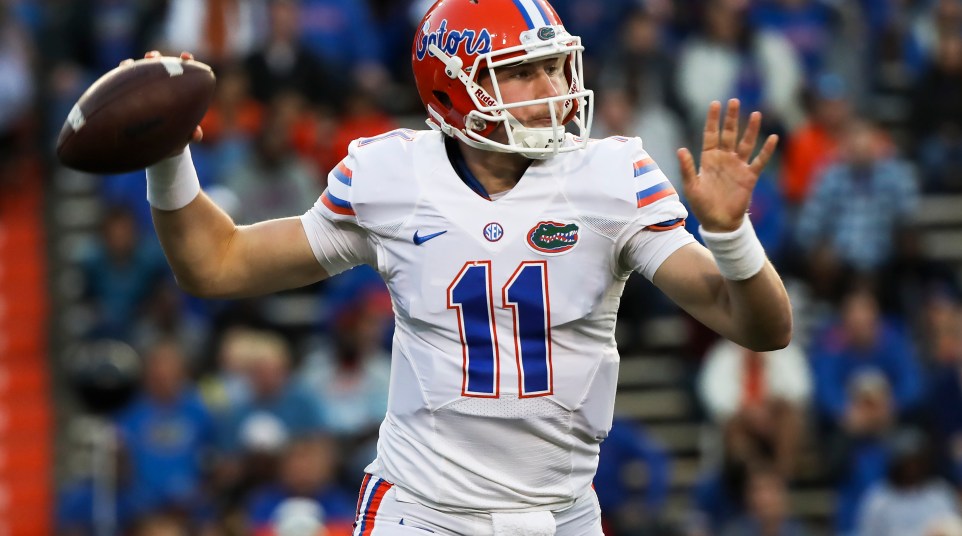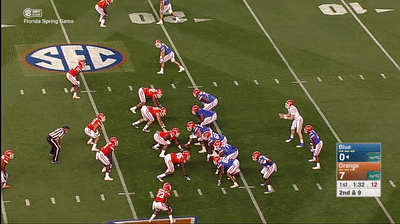
Breaking down Florida's QB battle: The case for Kyle Trask
One week into Florida’s fall camp and the Gators are in a familiar spot: There’s no clear-cut starter at quarterback.
How common a problem has this become in Gainesville?
Florida has started more quarterbacks (12) than any program in the SEC since the departure of Tim Tebow in 2009, and the Gators have had two quarterbacks start at least two games in every season since 2011.
Last year’s abysmal 4-7 campaign was rock bottom, with the Gators finishing 108th in S&P+ offense (lowest-ever finish) and incumbent primary starter Feleipe Franks finishing with a passer rating of 113.3, which was the second-lowest number in the Power 5 (only Texas A & M’s Kellen Mond was worse).
Enter Dan Mullen, the quarterback-whisperer and developer of quarterback talents from Alex Smith to Tim Tebow to Dak Prescott. If Mullen can’t fix it, who can?
The Gators entered camp with three candidates for the starting job: Franks, redshirt sophomore Kyle Trask, and true freshman and prized recruit Emory Jones.
After a week of practice, Dan Mullen claims there is no leader, but he stated he’d like to solve that riddle before the opening game against Charleston Southern.
Mullen says he doesn't want to go into game week without a starting QB named.
— Nick de la Torre (@NickdelaTorreGC) August 10, 2018
SDS is breaking down the case for each as the starter over the next week, starting last Friday with Feleipe Franks.
Today, we tackle the case for starting Kyle Trask.
He had the best spring practice of the three, entering the fall with confidence and momentum
Aside from one marvelous scrimmage by Franks, Trask was easily the program’s best quarterback in the spring. A deadly-accurate thrower, Trask shined in the spring game and showed a penchant for taking what the defense gives him — a significant issue for the cannon-armed Franks and a requirement in Mullen’s offense.
It’s instructive that Dan Mullen isolated the best play in Florida’s first week of practice as being something similar- a Trask checkdown when his two primary options were covered.

This play, from two spring games ago, where Trask makes a simple throw for positive yards after his primary option is covered, illustrates an important aspect of offense.
The key to success in most offenses is staying ahead of the chains and in favorable down and distance situations — what coaches refer to as “being on schedule.” It’s even more vital in Mullen’s run-dominant spread, where the formations alone create deception so long as the down and distance aren’t predictable.
If Trask is the best suited to keep Florida drives alive by taking what the defenses offer, that’s a compelling reason he should start.
Plus, he’s coming off a big spring and should feel plenty confident about his initial grasp of Mullen’s offense. That confidence can make all the difference in a quarterback battle against Franks, who by his own admission is rebuilding his self-belief this fall in addition to learning a new offense.
His accuracy offsets the perceived — but not statistically supported deep ball strength of Franks
Mullen’s quarterbacks at Mississippi State weren’t lethally accurate.
Mullen only had quarterbacks complete over 60 percent of their passes on three occasions: Chris Relf in 2010 (60.1%), Dak Prescott in 2014 (61.6%) and Prescott again in 2015 (66.5%). That’s not an incredible rate for a coach at a program since 2009.
But his numbers at Utah and Florida were far more consistent, with his starter finishing above the magic 60 percent accuracy threshold every year he served as offensive coordinator at each location (Alex Smith 67.5% in 2004 at Utah; Leak 62.8% and 63.6% in 2005 and 2006; Tebow 66.9% and 64.8% in 2007 and 2008).
The Tebow numbers are especially interesting, because as most everyone knows by now, Tebow wasn’t an “electric” downfield thrower, or even particularly accurate. But Mullen could consistently rely on Tebow to make the proper reads and deliver simple, accurate throws to playmakers in space, and because of that, Florida had outstanding balance offensively.
Trask isn’t in the same universe as Tebow or Smith as a runner, but if he can make short, accurate throws to playmakers in space, Florida has a chance to make a huge jump offensively in 2018 because, as we’ve noted at SDS — this is the most outstanding collection of wide receivers Florida has had in a decade and there’s a stable of talent at running back to complement them.
Fortunately, that’s what Trask appears to offer.
On the first three completions of the spring game- all simple in route, out route and screen concepts- Trask delivers the ball on-time and accurately to a playmaker in space (Toney twice, Trevon Grimes once).
With Florida’s talent elsewhere, a game manager who makes the simple play could be just what Mullen needs in Year 1.
The largest argument for Franks, on the other hand, seems to be that his rocket arm and physicality allow Florida the chance to hit the home run. Franks throws a nice deep ball, as we documented last Friday. The Tennessee throw will live forever in Gators’ lore.
But he doesn’t complete the play enough.
Which SEC QBs throw the best deep ball?
Among returning QBs, here's how they stack up in terms of adjusted completion percentage. pic.twitter.com/wM8ixgBRJf
— CFB Film Room (@CFBFilmRoom) August 9, 2018
In fact, as the above graphic demonstrates, in terms of adjusted completion percentage (catches plus drops divided by attempts), Franks was by far the worst quarterback in the SEC statistically on throws of 20 yards or more last season.
If that’s what Florida fans are afraid to sit on the bench, Florida has larger issues.
Outside of inexperience, the other negative arguments just don’t make much sense
One argument I’ve heard against Trask is that he’s a 3-star who was recruited by McElwain. Huh?
Antonio Callaway was too. That worked out fine until the Credit Card Nine.
Feleipe Franks was a 4-star quarterback recruited by McElwain. To date, that hasn’t worked out that well.
McElwain made quarterbacks recruited by other coaches work out fairly well, from 3-stars Greg McElroy and Garrett Grayson to blue-chip Will Grier for a hot minute at Florida. What he couldn’t do was develop his own guy.
Disqualifying Trask because he was recruited by McElwain — and turning around and anointing another McElwain recruit the starter — is lunacy.
Experience is the most fair question mark.
Trask hasn’t started a football game in a long time. He was the backup to the wonderfully-talented Houston Cougars QB D’Eriq King at Manvel High in Texas and has spent his first two years in Gainesville holding clipboards or hurt.
Adjusting to the speed of college football and the SEC will take time. Mullen’s track record here is good, though.
He’s made stars of 3-star quarterbacks with small offer sheets before (Dak Prescott, Nick Fitzgerald) and made another one (Chris Relf) a competent, 9-game winner. And while Prescott and Fitzgerald were high school starters who played sparingly as freshman, neither started until they were at least sophomores. Trask has been on campus three years. He’s waited his turn and put in his time.
It might be time to see what he can do on the field.
